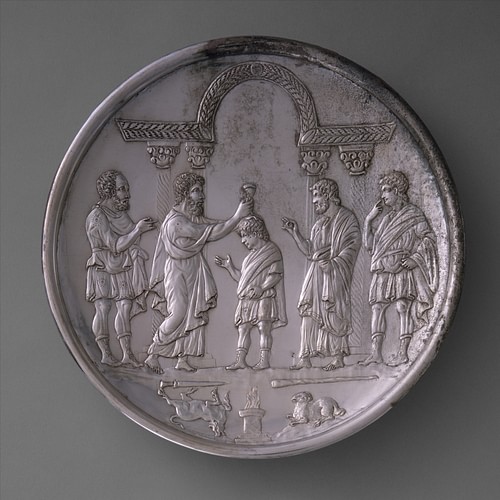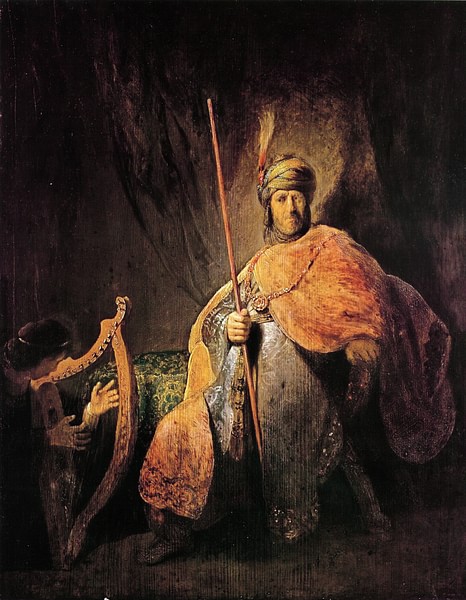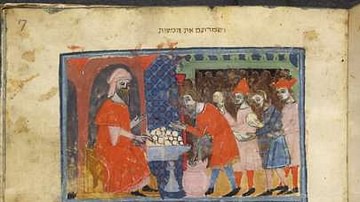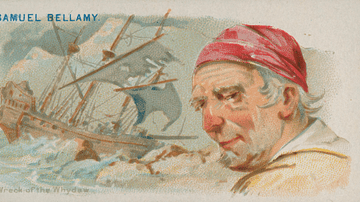
Samuel is a character in the Hebrew Bible and the Old Testament, uniquely depicted as having served several roles, as judge, military leader, seer, prophet, kingmaker, priestly official, and loyal servant of Yahweh. He is traditionally thought to have played a pivotal role in ancient Israel's transition from the judges to the monarchy.
Authorship
Of the many ways the story of Samuel in the Bible is viewed, Tony Cartledge suggests, "While putting more or less trust in the veracity of the materials, the reader must approach the text on at least two levels: as story and as history" (13). Based on 1 Chronicles 29:29-30, the books of Samuel in the Old Testament are traditionally thought to have been primarily authored by the person Samuel, "with supplementary information about the period following his death being supplied by the prophets Nathan and Gad" (13).
However, modern scholarship provides another view. When the particulars of purported accounts of historical events diverge, this suggests multiple authors or sources. For example, in the flood story in Genesis, one version has Noah gathering one pair of each kind of animal; another has him gathering seven pairs of clean animals and one pair of unclean animals; in one account, Noah sends out a dove; in another, he sends out a raven; in one version the flood lasts a year; in another 40 days and 40 nights, and so on. The Bible is replete with such instances. That is an indication, as Richard Friedman says, "of a skillful redactor capable of combining and organizing separate documents into a single work that was united enough to be readable as a continuous narrative" (60). After all, someone somewhere brought the compilation of material we know as the Bible to its final version.
As the Hebrew Bible has been translated largely through the Masoretic Text and Greek Septuagint, in modern times, the source-critical view of authorship has come to play a prominent role in the historiography of the Bible. Building on the works of others, German biblical scholar Julius Wellhausen (1844-1918) brought what has come to be known as the "documentary hypothesis" of authorship into a more thorough form. According to Wellhausen, for the first five books of the Bible, known as the Pentateuch, an editor had at his disposal the works of four authors of different classes, writing at three different stages of Hebraic religious evolution. The earlier J (Jehovah) and E (Elohim) sources "reflected the nature/fertility stage of religion. Writing later, D (Deuteronomy) reflected the spiritual/ethical stage, and P derived from the priestly/legal stage" (Friedman 24-26). While many other aspects of Wellhausen's work have been criticized, the idea of redaction of multiple sources remains the basis for source-critical methodology.
A second seminal and more recent contribution comes from Martin Noth (1902-1968). His Deuteronomist history postulates that the books of Deuteronomy, Joshua, Judges, 1-2 Samuel, 1-2 Chronicles, and 1-2 Kings were all "the work of a single writer working in the exilic period, who organized the various old units and complexes of material available to him into a continuous history of Israel from the entry into Canaan until the beginning of the exile" (McCarter, 4). Considering style, language, and thematic similarities to Deuteronomy, Noth identifies the writer of Deuteronomy, with the interests of P, as the sole compiler and editor of the books of Joshua to 2 Kings.
However, with a revision, Frank Moore Cross (1921-2012) places a primary edition (Dtr¹) to the pre-exilic time of king Josiah with a secondary touched-up version (Dtr²) completed during exile. Finally, Richard E. Friedman postulates that Dtr¹ and Dtr² were the sole collaborative works of the prophet Jeremiah and his scribe Baruch, as they fit the bill of P and were alive during Josiah's reign and were together in exile in Egypt.
Concerning Samuel as part of Deuteronomist history, several divergences suggesting multiple authors are pointed out.
Besides the twice-mentioned death of Saul (1 Sam 31; 2 Sam 1), there are other duplicate versions of the same events. Eli is twice warned that his priestly dynasty will fall (1 Sam 2:27-36; 3:11-14). There are two accounts of Saul's public acclamation as king (10:17-24) and two of his rejection (13:14; 15:23). When David flees from Saul, he is twice betrayed by the Ziphites. (Cartledge, 4)
Then there are hard-to-reconcile accounts, as in 16:14-23, where David becomes Saul's personal musician and assistant, yet in the next chapter, when David offers to fight Goliath, he is unknown to Saul. Then there is the antagonism towards the monarchy in 7:1-8:22, but in chapters 9-11, a seeming vote for it "as a means of divine deliverance" (Cartledge, 4). Moreover, there are stand-alone sections such as Hannah's Song, the Ark Narrative, and the Court History of David, where there is no mention of Samuel though in other places he is purported to have vetted and anointed the king.
There remains a lack of consensus as to when excerpts were written and collated, the number and level of completion of the sources received, and if there were one, two, or a school of editors. Regardless, the seriousness and respect with which the source materials were handled are reflected in the fact that divergent narratives were maintained, even though it might have been tempting for the sake of a stronger appearance of historicity to delete countervailing ones.
Moreover, while the source-critical method of the historiography of the Bible has maintained the lion's share of attention within scholastic circles for some time, in recent times, literary criticism and inquiry into the social world of the Bible are making important contributions. Archaeological finds are also having their impact. The Zayit Stone, discovered in 2005 and dating to the 10th century BCE, inscribed with the Old Hebrew alphabet, may, for some, moderate the position of a narrative built on eons of oral tradition. It appears the Hebrews were literate early on, which may shed new light on source material considerations. Friedman's theory that Baruch was the final author of Deuteronomist history is strengthened by the Baruch stamp find, which shows that a person named Baruch lived and was a scribe at that time. The Aramaic inscription bytdwd from Tell Dan recently discovered by Avraham Biran and J. Naveh, as it is thought to be translated as "House of David," confirms for some the historicity of king David and lends credit to the stories surrounding him and those such as Samuel, associated with him.
Nonetheless, as Cartledge shares, camps for and against the historicity of the Old Testament are divided into the minimalist approach "of the Alt-Noth school who argue that scientific historiography cannot simply accept the Old Testament at face value" and the maximalists "from the Albright-Bright circle who believe the Old Testament documents are more trustworthy and while acknowledging discrepancies, may be used to reconstruct the history of ancient Israel" (9). As part of that history, the story of Samuel is one of transition between the period of the judges and the monarchy. Portrayed to have facilitated that passage, Samuel is shown serving several leadership roles.
Samuel as Judge & Military Leader
It is difficult to overestimate the importance of covenant in the Bible. In the Christian tradition, the very names Old Testament and New Testament reflect this importance, for the Latin word Testament means covenant ... Moreover, as part of Deuteronomistic history the Deuteronomist presents his history consistently in terms of covenant. He depicts the fate of the kings and the people as dependent on how faithfully they keep their covenants with God.
(Friedman, 104)
In line with the Yahweh-covenant theme of Deuteronomist history, Samuel's role as judge resulted from the checkered history of the people he served. As the Old Testament narrative purports, once Moses brought the Israelites to the edge of Canaan, then after Joshua's conquest, Israel's keeping of Yahweh's dictates was short-lived. As the Israelites incorporated the idol veneration and ritual worship of the gods of the Canaanite religion, such detachment from Yahweh is the given cause for their defeat at the hands of the various Canaanite tribes. This gave rise to individual judges who would lead successful military campaigns and a return to Yahweh when the suzerainty of the Israelites over their neighbors was restored. However, the Israelites inevitably returned to the gods and ways of the land. Such a cycle of infidelity, defeat, and salvation is the common theme throughout the Book of Judges.
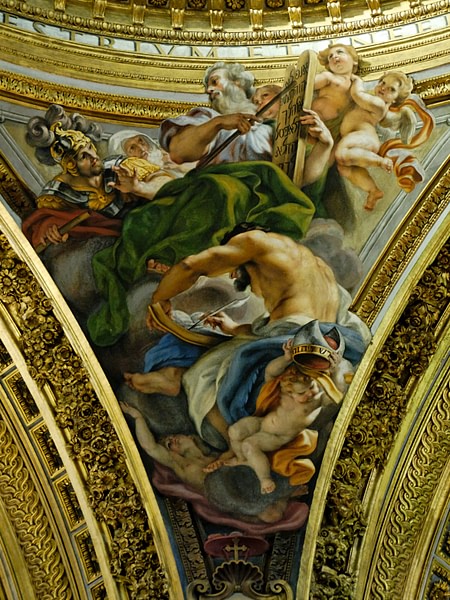
In keeping with the narrative of the judges as military saviors and covenant restorers, Samuel would lead the Israelites against the Philistines. The 'against-all-odds' theme of the military campaign of Gideon, where Yahweh himself plays a critical role, is similarly played out in 1 Samuel. In Judges 7:1-25, Yahweh instructs Gideon to reduce the size of his forces from 32,000 to 300 with an ingenious ruse that has the Midianites destroying each other at night, with the Israelites mopping up fleeing combatants. In 1 Samuel 7:1-17, after the Israelites' back-to-back defeats and loss of the ark, the Philistines gather again at Mizpah. As covenant-restorer, Samuel promises the Israelites salvation from the Philistines if they would once more quit the worship of "foreign gods" and serve Yahweh. As panic sweeps through the camp, the troops plead with Samuel to "not stop crying out" for Yahweh's rescue. After Samuel performs a sacrifice, thunder "sent from Yahweh" puts the Philistines into such disarray and panic that the Israelites' win is, like with Gideon, more of a mopping-up process. According to the text, Samuel continues leading and judging Israel "all the days of his life" as he goes on an itinerary route of Bethel, Gilgal, and Mizpah, presumably teaching and reinforcing the ways of Yahweh.
Seer & Prophet
It is interesting to note at the start of the story of Saul's rise to kingship, Samuel is referred to as a 'seer'. In other places, he is a prophet. Yet, while the roles of seer and prophet are shown to have shared characteristics, distinctions are made. In 2 Chronicles 12:15, the history of Rehoboam's reign is claimed to have been written by Shemaiah, the prophet, and Iddo, the seer. In 2 Chronicles 29:25, the stationing of the Levites in the temple with "cymbals, harps and lyres" was done as prescribed by "Gad, the king's seer, and Nathan the prophet." Thus, the tasks of seers are pictured as serving a narrower audience with the specific purpose of knowing otherwise unknowable things – or divining outcomes. Prophets, on the other hand (though they also made predictions), served a wider community to keep or return them to Yahweh's ways.
In 1 Samuel 9:1-11, before he was king, when Saul went to look for his father's lost donkeys, after almost giving up, his servant suggested they go to a man of God, a 'seer' named Samuel, who could tell them for a fee where the donkeys were. It appears seers were also retained by the king. In 2 Samuel 24:11 and 1 Chronicles 21:9, Gad is referred to as "David's seer." In 2 Chronicles 35:15, Jeduthun is the "king's seer." Additionally, much like other ancient peoples, as priests performed auguries for consultation by their leaders, it is possible the seers of Israel were consulted, especially in times of war, to predict outcomes. Two seers are certainly portrayed as having a say in the military actions of their kings. Hanani castigates king Asa for not relying on Yahweh against the king of Aram in 2 Chronicles 16:7, and Jehu criticized Jehoshaphat in 19:2 for helping Ahab in the battle for Ramoth-Gilead.
As Samuel is referred to as a 'seer' and is portrayed performing seer-like tasks – for example, in 1 Samuel 10:1-8 he sends Saul to Gilgal and with detail predicts when, where, and whom he will meet on the way – he is also recognized as a prophet. In 1 Samuel 3:1-21, the pericope of Samuel in the tabernacle as a child finishes with the description, "And all Israel from Dan to Beersheba recognized that Samuel was attested as a prophet of the Lord." With that duty in mind, perhaps his best work as a prophet was when he also performed the role of kingmaker, the commission which was made legitimate from his priestly training.
Priestly Official & Kingmaker
Whether the story of Samuel is interpreted from a source-critical, historical, or literary point of view, the legitimation of Samuel as an essential leader gains its greatest credence from his performance of priestly functions. Perhaps this is why, though he follows in the footsteps of the judges, the story about him begins with his priestly training under Eli. Though Eli is of the line of Aaronic priests and his sons were to succeed him, Yahweh rejects them as priests because of their corruption and Eli's lack of correction; Hophni and Phinehas die in the battle against the Philistines, and Eli dies falling off his chair when he hears about it. In contrast, though Samuel is never described as a priest or is of Aaronic lineage, he is always pictured following Yahweh's directives. Since his priestly training began as a child, the narrative about him portrays little doubt regarding the acceptance of his authority to make sacrifices and anoint kings – things priests would do.

As with all ancient societies, social order cannot proceed without ritual sacrifice by religious authorities whose sanction comes from the gods. As Samuel's sanction came from Yahweh, he performed the sacrifice before the battle at Mizpah. When Saul was looking for Samuel about the lost donkeys, he was told to hurry, "as the people will not begin eating until he comes, because he must bless the sacrifice" (1 Samuel 9:13). Likewise, as a necessary step to Saul's recognition as king, he instructs Saul to go on to Gilgal where he would "sacrifice burnt and fellowship offerings" (1 Sam 10:8, 11:14-15). Depicting Samuel as a kingmaker performing priestly functions, the Samuel narrative also shows that to be king, Samuel must first anoint one – after which comes a transformative effect on the king.
Of other people of the Ancient Near East the Hittites uniquely anointed their kings, while certain Egyptian officials and vassals were also anointed. [Moreover] the use of oil ... gives anointing a contractual or covenantal meaning. ... The story of David's anointing forms a parallel to the anointing of Saul as prince. (Klein, 158-59)
Before Saul's coronation as king, in 1 Samuel 9:22-10:10, Samuel invites Saul and his servant to dine with him and 30 other guests. The next morning, on seeing him off to Gilgal, Samuel anointed him with a flask of oil. Then, as part of Samuel's predictions concerning his trip, as Saul met and took part in a procession of prophets, "the spirit of God came powerfully upon him." In a parallel way, in 1 Samuel 16:4-13 after Saul's rejection by Yahweh, Samuel travels to Bethlehem where, after the sacrifice, he anoints David to become king and, like with Saul, "from that day on the Spirit of the Lord came powerfully upon David." Finally, while sacrifices and anointing are part of priestly functions and essential to the making of kings, the role of Samuel as a prophet and loyal servant of Yahweh would not be complete without his promotion of the Yahweh covenant. The story of Samuel shows him using the transition from judges to the monarchy for this very purpose.
Loyal Servant of Yahweh
One of the main facets portrayed about the character of Samuel is his dutiful obedience to Yahweh, even against his desires. In 1 Samuel 8:4-22, Samuel flat did not want a monarchy. He tried to talk the people out of it, but Yahweh, with the final say, allowed it, and Samuel dutifully made it happen. Moreover, even as kingmaker Samuel is shown not to let slip the discharge of his role as prophet, and mentions in 12:23-24 his duty to teach the ways of Yahweh. After Saul's coronation as king in 1 Samuel 11:15, Samuel, now an old man, reiterates, with specifics, the nation's past cycle of infidelity, defeat, and salvation and promises the king and his people good things if they put away the Baals and turn to Yahweh, but defeat if they do not.
While the Yahweh-covenant theme is prevalent throughout the story of Samuel, as the narrative portrays Samuel as a loyal servant of Yahweh from childhood to old age, he discharges his duty as a prophet promoting at every opportunity fealty to Yahweh. Known as a seer and with the training of a priest, his sacrifices and anointings are recognized as essential to the community he served. Traditionally thought to have lived around 1100 BCE, as he is pictured as the last judge, then as kingmaker, the story of Samuel plays a pivotal and explanatory role in an important transition period for ancient Israel, from the period of judges to the monarchy.

